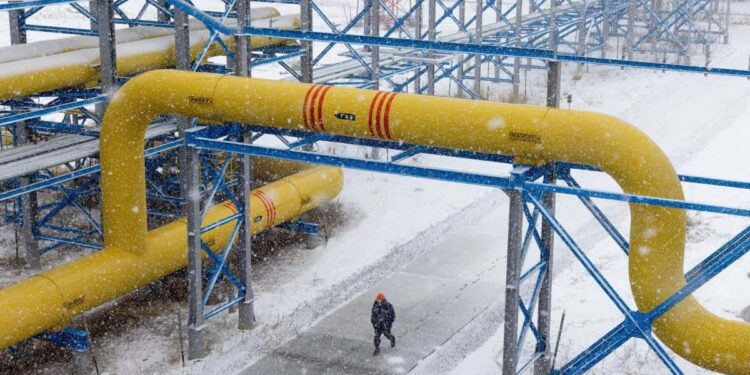Austria has called on the European Union to consider resuming Russian gas imports if a peace agreement is reached in Ukraine, Reuters reports. The proposal marks a significant shift in the continent’s energy discourse, as EU countries have largely moved away from Russian energy supplies following Moscow’s invasion of Ukraine. Austrian officials argue that restoring gas trade could help stabilize energy markets and ease soaring prices, but the idea remains contentious amid ongoing geopolitical tensions.
EU urged to revisit Russian gas imports contingent on Ukraine peace progress
Austria has called on the European Union to reassess its stance on Russian gas imports, linking potential resumption to significant progress in peace negotiations in Ukraine. The Austrian government emphasized the importance of balancing Europe’s energy security needs with diplomatic efforts, suggesting that normalized energy ties could act as an incentive for sustained peace. This position arrives amid ongoing debates within the EU regarding energy diversification and the geopolitical implications of maintaining sanctions against Russia.
Key points highlighted by Austria include:
- Energy security: Europe faces rising challenges with supply shortages and growing demand.
- Ukraine peace progress: Any easing of gas import restrictions should be conditional on verifiable diplomatic milestones.
- EU solidarity: Maintaining a unified stance while exploring pragmatic solutions to stabilize markets.
The proposal underscores a pragmatic approach where energy policy is closely intertwined with foreign affairs, aiming to encourage constructive outcomes in the region while addressing urgent economic pressures within the EU.
| Aspect | Current Status | Proposed Condition |
|---|---|---|
| Russian Gas Imports | Restricted by EU sanctions | Resumption tied to Ukraine peace |
| Ukraine Peace | Ongoing negotiations | Measurable progress required |
| EU Energy Security | Under pressure | Enhanced through diversified sources |
Austria emphasizes energy security and economic stability in EU policy debate
Austria’s recent statements have sparked significant dialogue within the European Union regarding the future of energy imports amid the ongoing geopolitical tensions. Austrian officials proposed that if a durable peace agreement is reached in Ukraine, the EU should seriously consider the resumption of Russian gas imports to safeguard the bloc’s energy security and economic balance. This pragmatic stance highlights Austria’s prioritization of stable energy supplies, especially as the continent faces unpredictable energy markets and rising costs that threaten industrial competitiveness and consumer stability.
Key arguments in Austria’s position focus on the following:
- Mitigating risks of energy shortages during winter months
- Alleviating inflation through affordable energy prices
- Ensuring long-term economic stability for member states reliant on Russian gas
- Aligning energy policies with diplomatic progress in the Ukraine conflict
| Aspect | Potential Benefit | EU Challenge |
|---|---|---|
| Energy Security | Stable supply in winter | Dependence on a geopolitically sensitive source |
| Economic Stability | Lower industrial costs | Balancing sanctions with trade relations |
| Diplomatic Leverage | Support peace incentives | Maintaining unity among EU members |
Experts advise phased reintegration of Russian gas with strict compliance measures
Energy experts emphasize the importance of a cautious and staggered approach should the EU decide to resume Russian gas imports following a peaceful resolution in Ukraine. They recommend implementing rigorous compliance frameworks to monitor contractual obligations and geopolitical developments, reducing risks of sudden supply disruptions. Such measures are seen as vital to safeguarding the EU’s energy security and ensuring that the reintegration process aligns with both political commitments and sustainability goals.
Key recommendations from specialists include:
- Gradual volume increases tied to verifiable milestones in the peace process
- Independent auditing mechanisms to verify origin and contract adherence
- Contingency plans to swiftly pivot to alternative energy sources if compliance lapses occur
| Phase | Action | Compliance Measure |
|---|---|---|
| Phase 1 | Limited volume imports | Regular transparency reports |
| Phase 2 | Scaled supply increase | Third-party contract verification |
| Phase 3 | Full integration | Continuous geopolitical risk assessment |
In Retrospect
As discussions around energy security and geopolitical stability continue to evolve, Austria’s call for the EU to consider resuming Russian gas imports contingent on a peace agreement in Ukraine underscores the complex interplay between diplomacy and economics. Whether the EU will revisit its stance remains a critical question amid ongoing negotiations and the broader effort to balance energy needs with political principles. The coming months will be pivotal in determining the future of Europe’s energy landscape and its relationship with Russia.
















